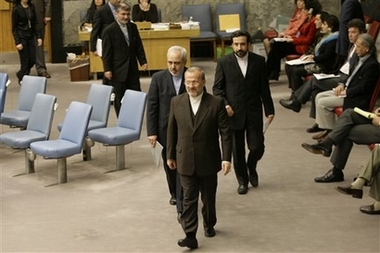UN to impose tougher sanctions on Iran
(AP)Updated: 2007-03-25 08:29
UNITED NATIONS - The UN Security Council unanimously voted Saturday to impose new sanctions against Iran for its refusal to stop enriching uranium -- a move that is leaving it increasingly isolated.
The moderately tougher sanctions include banning Iranian arms exports, and freezing the assets of 28 people and organizations involved in Iran's nuclear and missile programs.
About a third of those are linked to the Revolutionary Guard, an elite military corps.
The United States is "very pleased by the strength of this resolution" after two years of diplomacy, said R. Nicholas Burns, undersecretary for political affairs at the State Department.
In December, the 15-member Security Council ordered all countries to stop supplying Iran with materials and technology that could contribute to its nuclear and missile programs. It also ordered a freeze on assets of 10 key Iranian companies and 12 individuals related to those programs.
"It's a significant international rebuke to Iran and it's a significant tightening of international pressure on Iran," Burns said of the new sanctions. "We do believe it's going to leave Iran even more isolated than it has been."
Iranian Foreign Minister Manouchehr Mottaki rejected the sanctions and said Iran had no intention of suspending its enrichment program.
"The world must know -- and it does -- that even the harshest political and economic sanctions or other threats are far too weak to coerce the Iranian nation to retreat from their legal and legitimate demands," Mottaki told the Security Council after the vote. "Suspension is neither an option nor a solution."
Mottaki made the trip instead of Iranian President Mahmoud Ahmadinejad, who claimed he canceled his appearance because the US failed to deliver his visa in time. The US said it had issued the visa promptly.
Raising tensions, Iran detained 15 British sailors and marines Friday in what it said were Iranian territorial waters near Iraq. The British sailors and marines had been on a mission to search for smugglers in Iraqi waters.
The six world powers that drafted the new resolution spent Friday trying to overcome objections from several council members, reflecting concerns that anything short of consensus would weaken efforts to rein in Iran's nuclear defiance.
There were several minor concessions but no changes to the key sanctions agreed upon last week by the United States, China, Russia, Britain, France and Germany.
The new sanctions -- already a compromise between the stronger measures favored by the United States and the Europeans and the softer approach advocated by Russian and China -- are considered modest. The ban on exports is among the harshest measures, but many of Iran's arms sales may not be affected because they are illicitly sent to militant groups like Lebanon's Hezbollah and Shiite militias in Iraq.
Still, world powers hoped that approving the resolution quickly and unanimously would signal that Iran will face stricter sanctions each time it ignores a Security Council deadline to suspend uranium enrichment, a process that can be used to produce nuclear energy or nuclear weapons.
"This resolution sends an unambiguous signal to the government and people of Iran ... that the path of nuclear proliferation by Iran is not one that the international community can accept," said British Ambassador Emyr Jones Parry.
Iran responded to the first set of sanctions in December by expanding enrichment.
Tehran has offered to provide guarantees that its nuclear program won't be diverted toward weapons, as the US and some of its allies fear.
Iranian leaders kept up their defiant rhetoric in the days leading up to the vote, with Ahmadinejad calling the Security Council illegitimate and Supreme Leader Ayatollah Ali Khamenei suggesting Iran would pursue nuclear activities outside international regulations if faced with more sanctions.
The new resolution calls for voluntary restrictions on travel by the individuals subject to sanctions, on arms sales to Iran, and on new financial assistance or loans to the Iranian government.
It asks the International Atomic Energy Agency to report back in 60 days on whether Iran has suspended enrichment and warns Iran could face further measures if it does not. But it also says all sanctions will be suspended if Iran halts enrichment and makes clear that Tehran can still accept a package of economic incentives and political rewards offered last year if it complies with the council's demands.
After the latest resolution met with surprising resistance from several elected Security Council members, a reference was inserted to a past resolution from the IAEA calling for the Middle East to be free of weapons of mass destruction. Indonesia and Qatar had wanted the council to make that appeal outright, but that would have had implications for Israel, a US ally widely believed to possess nuclear weapons, though it has never officially acknowledged it.
|
||
|
||
|
|

